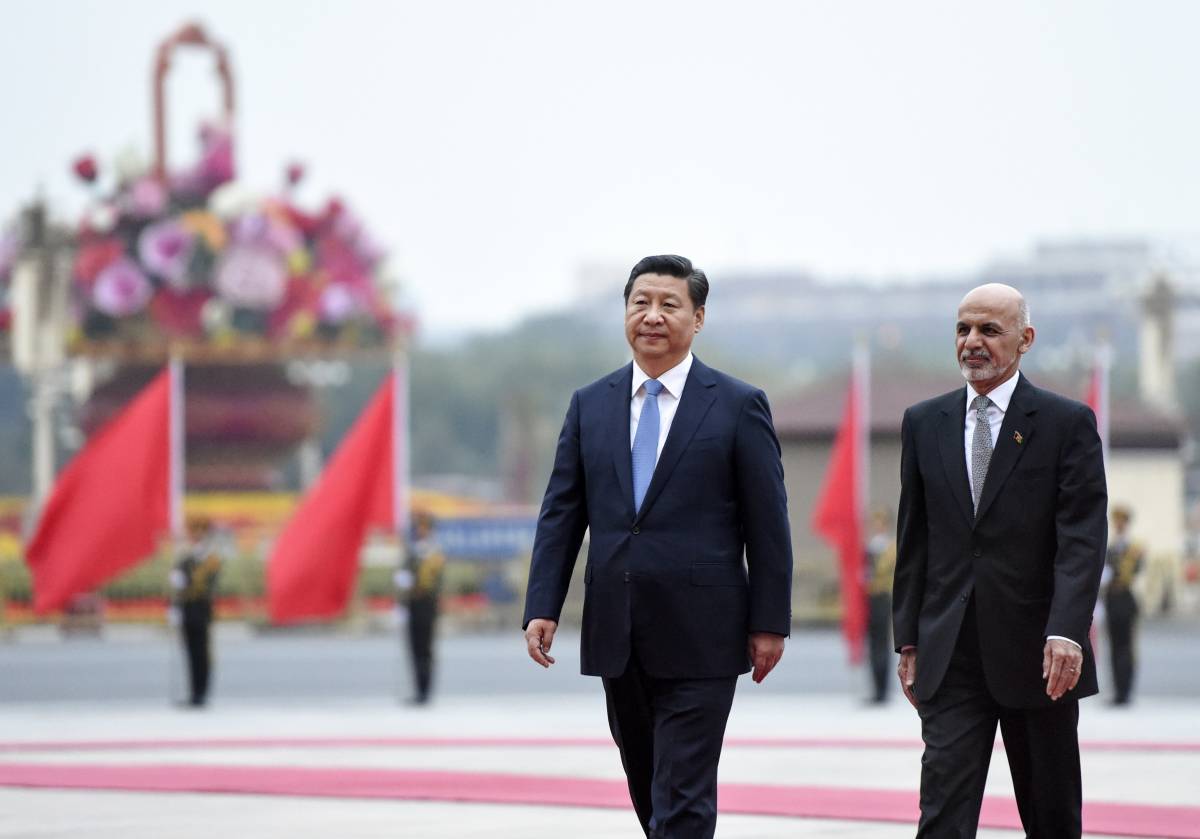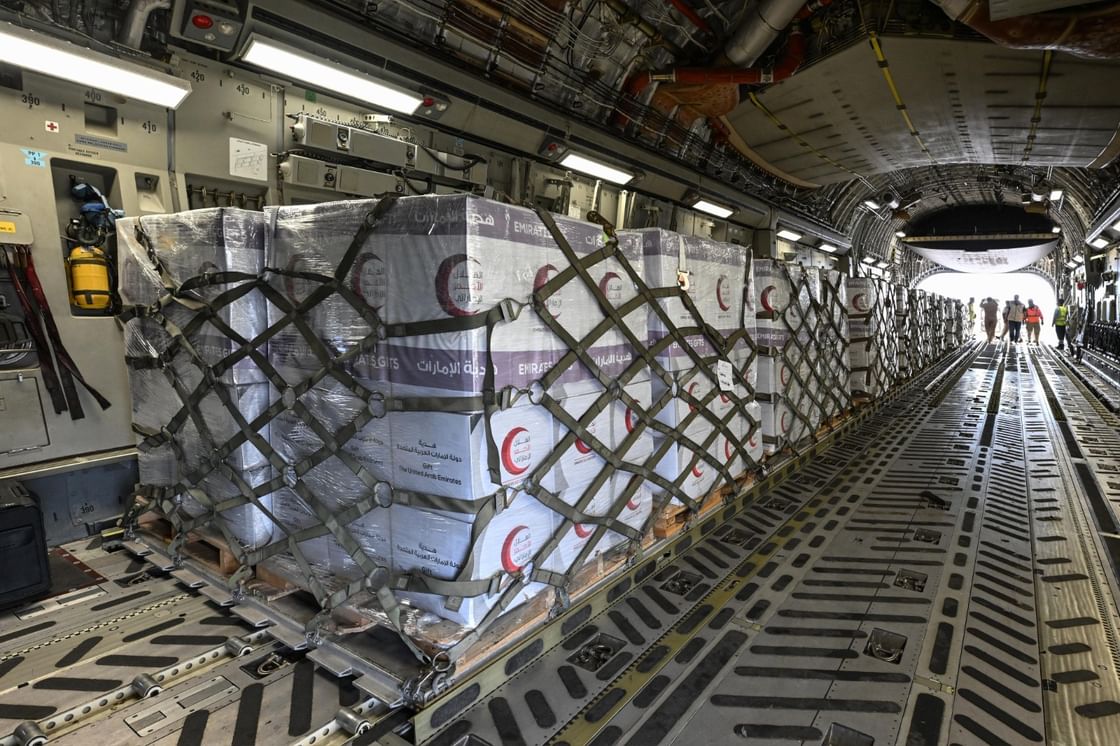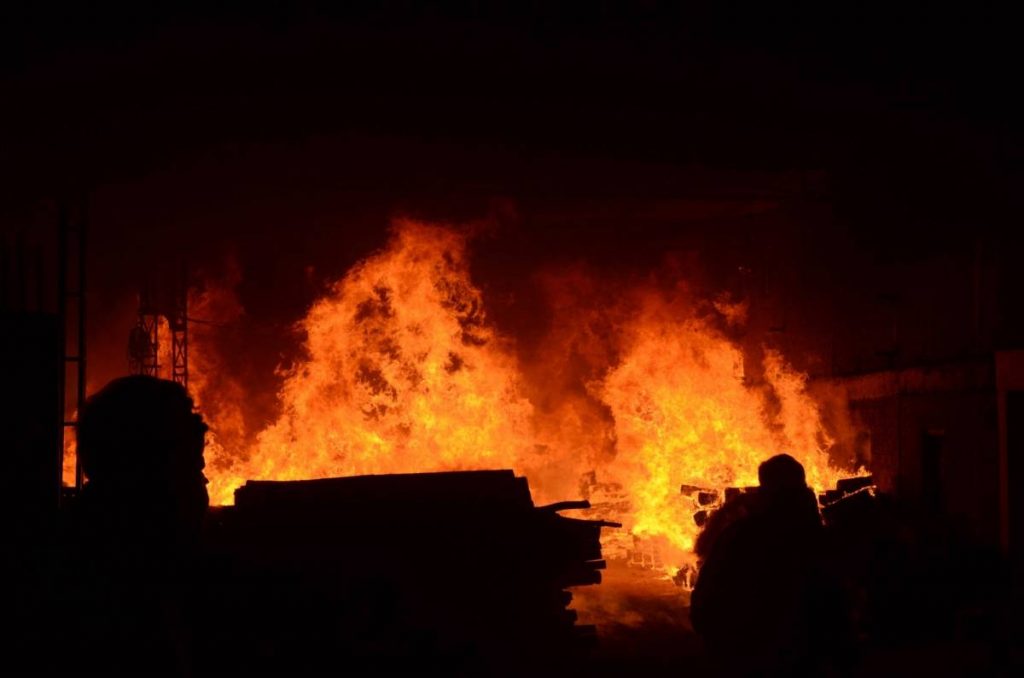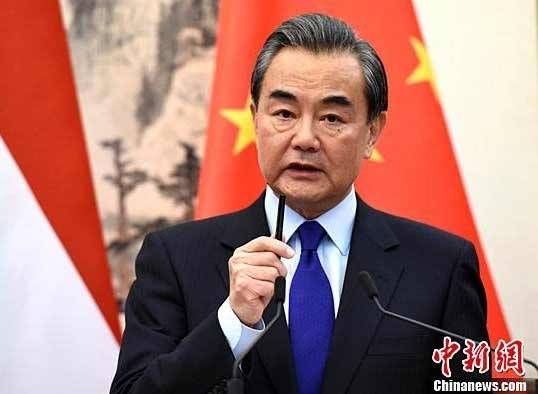The PLA will increasingly have to bear the burden of ensuring the survival of the Durand Line, and of assisting the military in Pakistan and the Taliban in Afghanistan to maintain control and in the latter case, be assisted in controlling the entire country, writes Prof. Madhav Nalapat

Consequences that are unexpected are not rare in situations where decisive action is taken by a state to enforce its own view of interests on others who may be unwilling to go along with such an exclusivist and usually expansionist view. In 1979, the United States under President Carter began the (eventually successful) process of turning its occupation of Afghanistan into quicksand for the Soviet Union. The 39th President of the United States chose a brilliant strategic mind rather than a denizen of the Washington establishment as his National Security Advisor.
The NSA, Zbigniew Brzezinski, was focused on weakening the Soviet Union, and in such a task, had the backing of his boss. The only problem was that in his hurry to secure quick results, rather than launch the process using the “frog in hot water” method, whereby the target takes time to understand the deadly impact of the change in circumstances deliberately (if covertly) created by the rival power, the NSA went in for what he believed (together with the Pentagon and the CIA) would be a quick fix. This was to outsource the operational aspects of the process to the Pakistan military, which was in the process of being converted into a Wahhabi force by Chief Martial Law Administrator of Pakistan, Zia-ul-Haq.
The army thereafter empowered not the overwhelming majority of Pashtuns, who were fiercely nationalist, but the extremist fringe, which placed the dissemination and practice of the Wahhabi variant of an overall moderate and modernising faith as a higher priority than nationalism per se. This was to the liking of Army Headquarters at Rawalpindi, as there was a constant apprehension in them that any boost to Pashtun nationalism may result in the Pashtuns within Pakistan seeking to unify with their kin across the border to create a separate and independent Pashtunistan. This had been the dream of several Pashtun leaders in the past, including Khan Abdul Ghaffar Khan, who during much of his long life (1890-1988) was known as the Frontier Gandhi for his long association with Mahatma Gandhi.
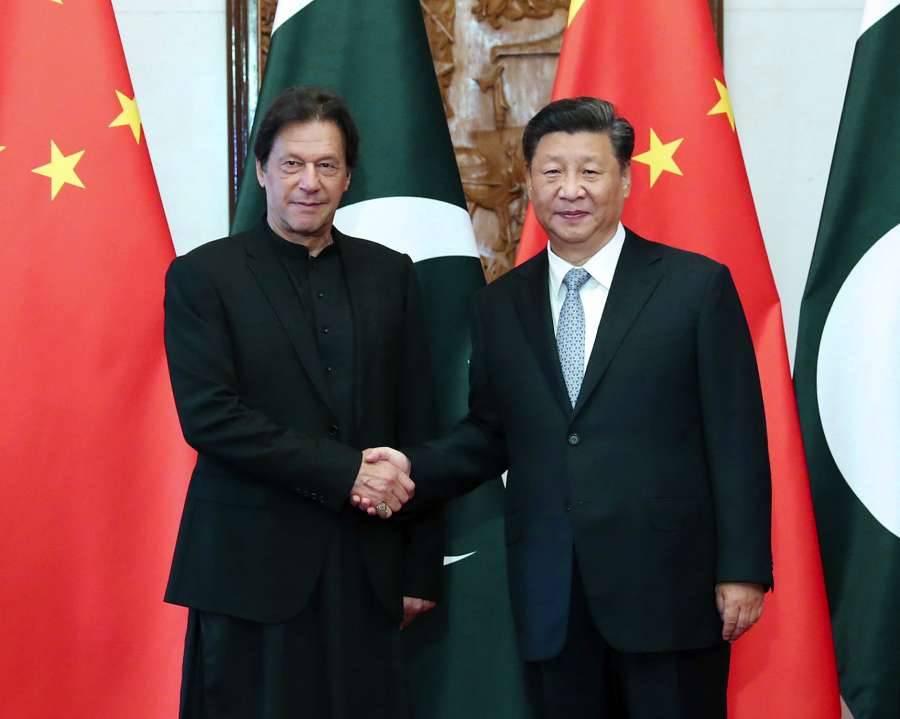
Perhaps as a panic reaction to the seizure of power by Imam Khomeini in Iran and the storming of the Mecca mosque by radicals in 1979, the Wahhabi variant everywhere was put on steroids by the backing of the US and its European allies. What needed. to be done was to double down on strengthening the mosern and moderate strain that is at the heart of Islam, rather than the reverse. This “historical blunder” has had severe global consequences. Across the Middle East and elsewhere, including in the Indian subcontinent, the Wahabi variant was generously funded and supported, resulting in the aborting of efforts at ensuring that the Muslim Ummah (or global community) be encouraged to evolve in a modern and moderate manner rather than be sought to get plunged into exclusivism and religious intolerance, neither of which was ever part of the message of the Quran.
These teachins were ignored, and new and misleading Wahabi-Khomeinist interpretations were popularised, with effects far beyond Afghanistan. In Pakistan, the Wahabi variant found its champion in Zia-ul-Haq, who as a consequence of his intervention in Afghanistan was forgiven for deposing in 1977. Zia subsequently hanged the elected Prime Minister of Pakistan, Z.A. Bhutto, in 1979. to silence from West Europe and North America, the presumed bastions of human freedoms.
BIDEN PIVOTS BACK TO EUROPE
Not that the fast-tracking of the Wahhabi variant was the only policy followed by the US that subsequently proved unwise. The US had (especially since the Atlantic Charter was signed by President Roosevelt and a less enthusiastic Prime Minister Churchill in 1941) been welcomed by freedom fighters in Asia as being different from those countries in Europe that had for centuries oppressed countries across t
he world to enrich themselves. Roosevelt believed in this process, and saw the Charter as a beacon of freedom across the world, while Churchill (determined to hold onto the British Empire after the war with Germany and Japan) regarded the freedoms listed in the document as being valid only for those of European extraction.
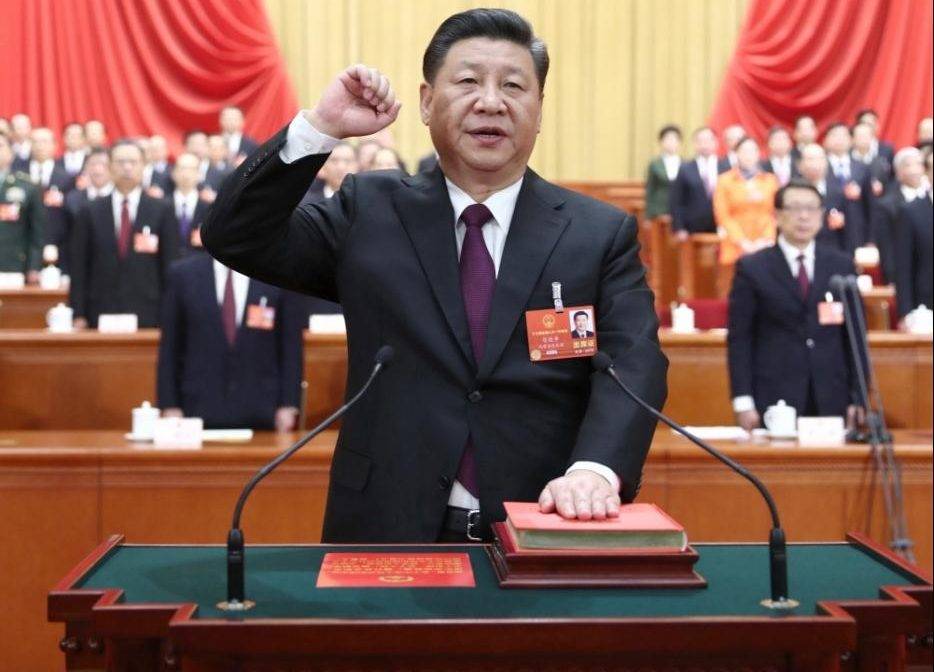
On the death of Roosevelt in 1945, his successor Harry S. Truman reverted to the policy of standing by the European colonial powers rather than with those fighting for freedom from their colonial oppressors, who had held on to most of their colonies even after the war had ended in victory for the Allies. The impact of this on US goodwill in the colonised countries was immense, and gave an advantage to the Soviet Union (with its ironical championing of the very freedoms that were being denied to Soviet satellites in East Europe) across Asia, Africa and South America. Among the disasters that ensued from backing a colonial power (in this case, France) against a liberation movement in Vietnam, the US entered the Vietnam war on the wrong side, immeasurably strengthening the communist rather than the ideology of democracy within the Vietnamese people, who saw the US as stepping into the shoes of the French in 1955 and therefore needing to be defeated. This finally happened in 1975 at immense human cost.
ALSO READ: India, China to hold military talks to resolve border issues
Old habits die hard, and when US President George H.W. Bush invaded Iraq in 1990 and his son followed suit in 2003, both made sure to ensure that Britain was prominent in the allied coalition. The incongruity of claiming to fight for freedom for the Iraqis while having the armed forces of the former colonial power as the primary partner did not strike either father or son, so deeply was the Atlanticist logic of the primacy of European interests over other comers embedded in the strategic culture of the US, something which began to substantively change only during the “pivot to Asia” from Europe of President Barack Obama, especially during his second term. The Europeanist line is witnessing a revival under President Joe Biden, who seems to have forgotten several of the lessons he ought to have picked up during the latter period of the Obama presidency, including on Cuba and Iran.
XI’S GRANDIOSE AMBITION
Unlike Biden, who remains fixated on Europe (excluding the Russian part) rather than on the entirety of the Eurasian landmass, Chinese Communist Party (CCP) General Secretary Xi Jinping is aware that it is the Indo-Pacific and the corresponding Eurasian landmass that will be crucial in determining the outcome of the battle of systems between the US and the PRC. Following in the path of Mao, who saw the PLA as by far the most important instrument of control by the CCP on China, Xi has placed the military at the heart of his drive to achieve pre-eminence within the Indo-Pacific, and the corollary (together with Putin) of achieving the same result within the entire Eurasian landmass. The hostility of the UK, France and Germany in particular to integrating the Russian Federation into the comity of US allies (because of the severe dilution of their primacy that this would result in) has ensured that repeated efforts, first by Gorbachev and later Yeltsin, for Russia to break into the US-led alliance alongside Europe have failed.
After having witnessed the sitting President of the US call him a killer in public, it should come as no surprise that the President of the Russian Federation, Vladimir V. Putin, has seen no option other than to accept the status of the junior partner in the Sino-Russian alliance that he has fashioned together with Xi Jinping. The consequences of such a close pairing (including, and especially within) the military and security establishment of both countries on the balance of power in Eurasia seem not have been factored in by Biden, Merkel, Macron and Johnson in their geopolitical strategies to the comprehensive extent that they have been taken into account by the CCP General Secretary. Unlike his three immediate predecessors, who kept from openly displaying their Mao-inspired vision of the PRC as the primary geopolitical force in the world , CCP General Secretary Xi has made no secret of this ambition. It has been out in the open since 2013, with those who deny the reality finding fewer and fewer places to hide.
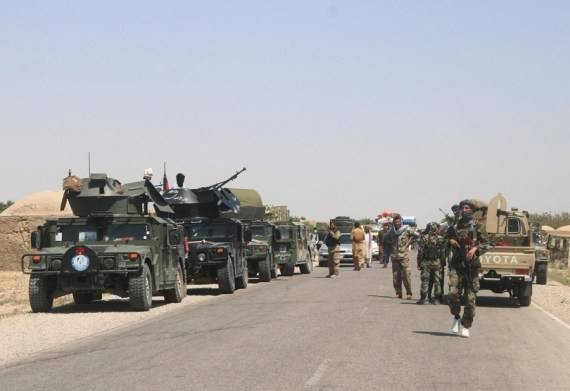
XI’S OVERREACH
Xi has certainly great confidence in his capability of effecting such a tectonic shift in global geopolitics, although not yet sure of exactly how long this will take. This is a switch that he seeks to incorporate into his legacy, which is among the reasons why he has ensured that the two-term limit followed since Jiang Zemin has been discarded. Another is the belief that the CCP contains within its 93 million members none other than himself with the capability of ensuring that Beijing replace Washington as the centrepoint of global influence and authority.
Such a belief may be leading the present CCP General Secretary into actions that may have the same consequences for him as a similar overreach accompanied by imperfect tactics led in many instances for the US and some of its allies. The “Arab Spring” of 2011 led to a Wahhabi Winter within the next few years for several of the countries affected by the popular discontent against oppressive regimes and deteriorating economic circumstances, thanks to the way in which a much smaller but better organised force is often able to take control of a popular movement. This was, for example, the case of the Khomeinist takeover of the discontent in Iran against the excesses of the Pahlavis during 1975 to the toppling of the dynasty in 1979, or to the Bolshevik seizure of power in post-Tsarist Russia in 1917.
In the linked destinies of Afghanistan and Pakistan in particular, the confidence in his infallibility and in the power of the PRC to ensure that its targets be quickly neutralised, may have created for Xi the same quagmire that Communist Party of the Soviet Union (CPSU) General Secretary Leonid I. Brezhnev entered into when he ordered Soviet forces to occupy Afghanistan in 1979, finally leading to their withdrawal in defeat in 1989. Xi has taken forward in an unprecedented boosting of (a) the CCP’s reliance on not the people or elected government in Pakistan but the Pakistan military to carry out Beijing’s wishes and (b) following that logic by in effect backing the takeover of Afghanistan by the Taliban.
ALSO READ: Pakistan bus blast: China puts hold on CPEC projects
During its own Afghan war, the US outsourced much of it to GHQ Rawalpindi, the headquarters of the Pakistan army, and to its proxies. Xi is doing the same now, the difference being that the people of Afghanistan know from 1996 to 2001 what rule by the Taliban means. Whatever the infirmities of the Ashraf Ghani government in Kabul (and these are more than a few), the people of Afghanistan, especially women and youth, know that it is preferable to rule by the Taliban. Several of the Afghan army commanders chosen by the US (acting on the recommendation of the Pakistan military) to embed within the Afghan National Army (ANA) gave up without a fight, aware that they (as distinct from most of the men under their command) faced no threat from the takeover of control by the Taliban.
This was similar to what took place in Iraq during the period 2013-15, when Iraqi commanders inserted into the armed forces of the government in Baghdad (substantially on the advice of nearby powers who wished at the time to see the fall of the Baghdad government by all available means) by NATO deserted without a fight to ISIS, giving that terrorist entity control of large swathes of Iraq. By 2014, the consequences of some of its personnel choices began to get clearer to the Pentagon, and subsequently, a US bombing campaign ensured that ISIS was reduced in size, finally to insignificance at least in terms of territory.
Given the far better appreciation of ground reality within the US military and security establishment than was the case in the past, it seems only a matter of time before President Biden will understand the risks to US security involved in removing not just ground troops (which is a necessary decision) but close air support as well in Afghanistan, which would be a disaster. US air support to an Afghan National Army with its weapons stockpile replenished by the US and also countries that have a significant interest in keeping Afghanistan away from extremist control such as India, would ensure the rollback of the Taliban.
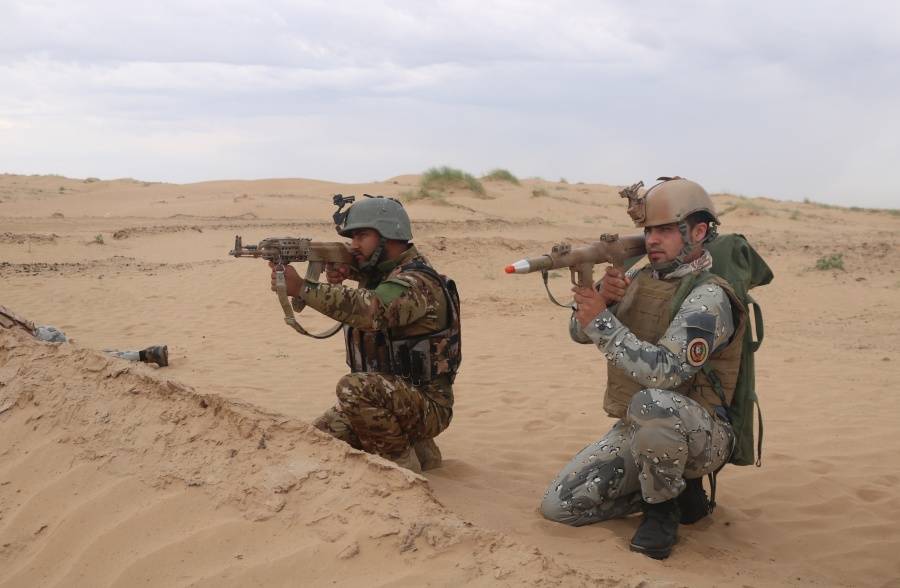
CHINA GAMBLES ITS FUTURE
This would be counter to the calculations of General Secretary Xi, who has placed his entire wager on the takeover of Afghanistan to the Taliban so as to further what he regards as the PRC interest there. It would also run counter to the immense majority of the Afghan population, who loathe a return to Taliban rule. Across those parts of Afghanistan where quislings within the Afghan military surrendered to the Taliban, much of the men under their command have begun using their guns together with the local people in order to resist the Taliban.
The 3-month ceasefire so generously offered by the Taliban to the Afghan military is for that exclusivist force to be enabled to devote its full attention towards quelling these local rebellions against the proxies and allies of the Peoples Republic of China and its “all-weather” ally, the Pakistan military (as distinct from the country or its people). Should this offer of a temporary ceasefire be accepted by the Ghani government, it would have the same disastrous consequences as the (Trump-ordered) release by President Ghani of 5,000 Taliban fighters from Afghan prisons has had for security in Afghanistan. The 2020 agreement entered into by the Trump administration at Doha was a disaster for not simply Kabul but Washington as well, and it is a matter of speculation as to why Trump’s Afghan policy has been so completely adopted by President Biden.
Across not just the military and the security establishment, awareness is increasing that the Trump-era policy of appeasement of the Taliban was an error of substantial magnitude, and which could lead in brief years to another 9/11 type of attack on the US homeland. Xi has dug himself in too deeply to retreat from the strategy favoured by the Pakistan military, for him to move out from the deepening predicament that this policy is causing for the PRC. Unlike President Biden, who while being obsessed with the 2022 midterms and the 2024 presidential elections, nevertheless still has the possibility of walking away from further errors, not by bringing in more US forces but by providing close air support, logistics and intelligence to the Afghan National Army. This could be done through Central Asia and possibly through the road and rail link being developed in Chabahar port by the Iran and India.
Unlike Trump, who was stubborn in clinging on to even obvious mistakes, Biden has shown a capacity to look at alternative views and to reconsider policy. Such flexibility is in line with the best practices of a genuine democracy, which the US is and looks set to remain. Given such a policy reset, Xi may find that his gamble on relying on the Taliban and its Pakistan army facilitators for carrying forward the PRC agenda of tapping into the natural resources of Afghanistan is likely to fail. While the Ghani government may be outwardly respectful to Xi, its own intelligence service is documenting the manner in which the Pakistan military (with assistance from the PLA) is boosting the capacities of the Taliban against the government in Kabul. Unlike some “experts” including in India and the US, Ghani will be fully aware that the Taliban entering his government in Kabul will be akin to the National Socialists under Hitler entering a “coalition” government in Berlin in 1933. That very soon went the Nazi way, and to the liquidation of alternative political and other forces, and similar will be the fate of groups not part of the Taliban network, were that entity to ever enter the national government in Kabul.
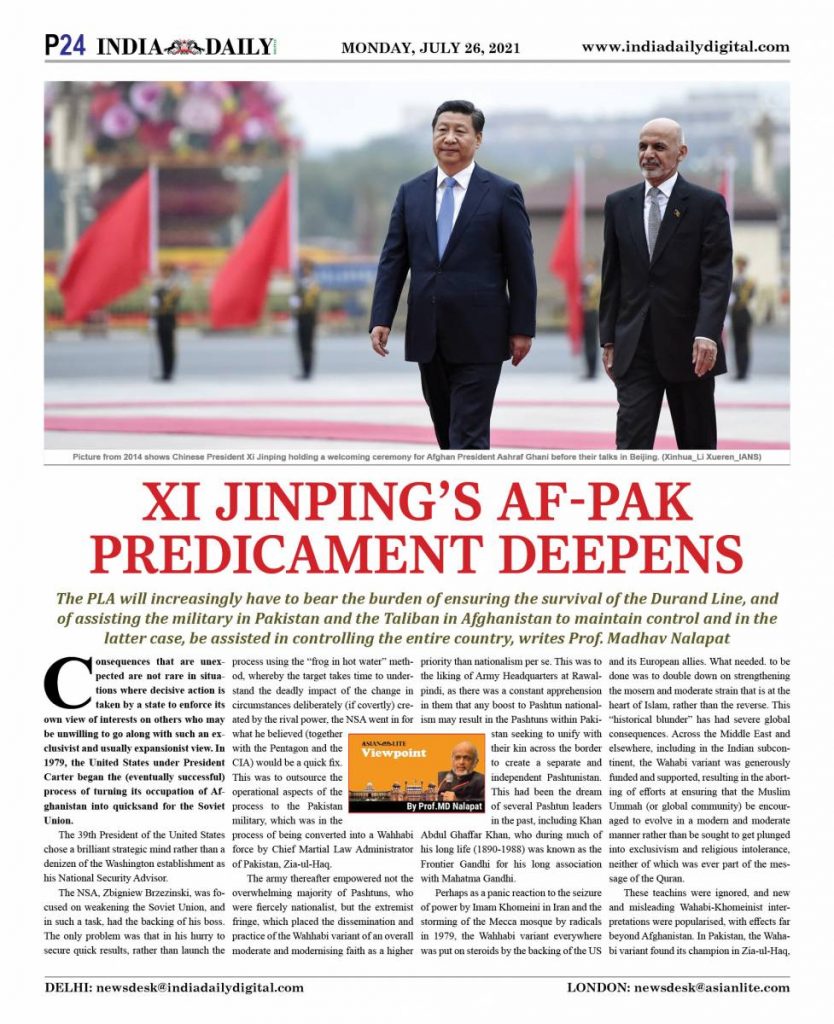
CIVIL WAR IS A REALITY
Even more worrisome for PRC interests will be the fate of a civil war in Afghanistan, a process that is already ongoing, on the domestic situation in Pakistan. The majority of Pashtuns in Pakistan, especially youth and women, are opposed to the outsize influence of extremist clerics under the umbrella of the Pakistan army. A similar situation prevails in those parts of Afghanistan that are presently under the occupation of the Taliban and the Pakistan and other auxiliaries who support them.
The majority of Pashtuns wish to be free of the Taliban and the clerics favoured by them, and weapons are already flowing from the country’s porous borders to ensure that they do not get overpowered by a militia backed by Pakistan and China, and which seems to be continuing to get appeased by the Biden administration, at least for now. Both in Pakistan against the control of the Punjabi-dominated and controlled Pakistan military and in Afghanistan against the Taliban and its Sino-Pakistan friends and auxiliaries, unrest is brewing and increasingly breaking out into violent opposition to the Taliban and its favourite clerics. As with the developing revolt againat rule by the ethno-centric generals in Pakistan.
The CCP General Secretary already deep into his commitment to the Pakistan military and its Taliban ally in the Af-Pak region. The China-Pakistan Economic Corridor is meeting with rising resistance along the way from the border of Xinjiang to the Indian Ocean through Pakistan, and this will increase. Neither India nor any other country can control the desire for freedom of the Pashtun people, who for too long have been under the thumb of an ethno-centric military and its superpower ally across both sides of the Durand Line, which Pashtuns point out lapsed in 1992. The PLA will increasingly have to bear the burden of ensuring the survival of the Durand Line, and of assisting the military in Pakistan and the Taliban in Afghanistan to maintain control and in the latter case, be assisted in controlling the entire country.
Leonid Brezhnev lasted long enough to understand the folly of his occupation of Afghanistan, and Xi Jinping is slowly having to come to terms with the inevitable consequences of militarily and otherwise taking the side of extremists and exclusivists against the majority of the people in both Afghanistan as well as Pakistan. The bog filled with quicksand has been entered still more deeply by China, and increasingly, there seems no way out to leave the quagmire without a severe loss of face that is politically impossible for General Secretary Xi to countenance. Especially given the trajectory of the manner in which he has consolidated internal power in China and sought to expand PRC control over more land, sea, mindspace and space.

